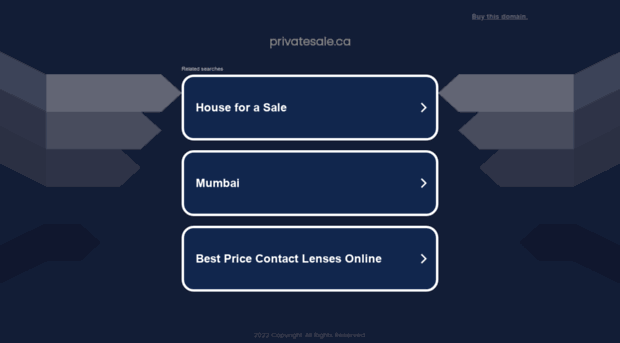Let other people’s adventures be your source of income!
A love of exploring the fantastic outdoors in the seat of a three or four-wheeler is just what people need to get a little excitement, and you can help people find it. You’ll meet all kinds of adventurers and novices, from families, to professionals, to anyone. Here’s what you need to consider to start your ATV Rental business journey:
As you can see in this graph of atv renting demand from 2004 to August 2021, ATV renting is back on the rise in Florida. This is a fantastic time to get into this business if you are interested.
The ideal place for renting ATV’s is a place with open space and back country recreational areas where the machines are been permitted nearby. Many ATV Rentals places use state parks through an agreement, or even family owned land. Check with your local federal or state agency which manages the region to learn what licenses or permits are needed to allow ATV riders in your designated area.
If you’re trying to find a building to work out of, you’ll need to decide whether you will have your own garage for doing service and repairs, as well as an office space. You’ll require an automobile storage space that is covered to keep your vehicles in tip-top shape. The best place for this kind of business would be just off a highway, well away from major areas to keep your riders safe.
ATV Insurance is mandatory to cover injuries, but a smart approach is to provide extra insurance to your customers, for an extra charge. This would cover collisions, damage, and any other troubles beyond what your base policy covers.
Be sure to explain the necessary deductible before the you charge them. However, if you choose to do so, you can automatically include it in their charge. If your client claims to already have insurance, request a copy of their coverage to affirm leases and rentals are also covered by it. A waiver may also be necessary to prevent legal troubles, lawsuits, and insurance disputes. If your clients refuse insurance altogether, they will need to sign a waiver making them legally responsible for all proceedings therein. Waivers are an included feature provided for free on the Rockon Recreation Rental platform.
If your clients refuse insurance altogether, they will need to sign a waiver making them legally responsible for all proceedings therein. Waivers are an included feature provided for free on the Rockon Recreation Rental platform.
Buying ATVs will be the most expensive thing you do. Begin your search with used ATVs in good condition to save you money. Start your business with the bare minimum, then increase the number in your fleet as demand increases. For example, you may receive requests for different kinds of vehicles, such as ones for children, double-seaters, and more. If you market to folks who will need to carry extra gear for excursion or hunting purposes, it can get even more expensive.
Our recommendation? Start with low cost vehicle, that you can rent for cheap to break into the market. If you look around, you will see most four-wheeler rentals start at $250 for 4-hours. Most people don’t want to pay that much. Come to the market with rentals at a fraction of that price, and you are sure to attract customers.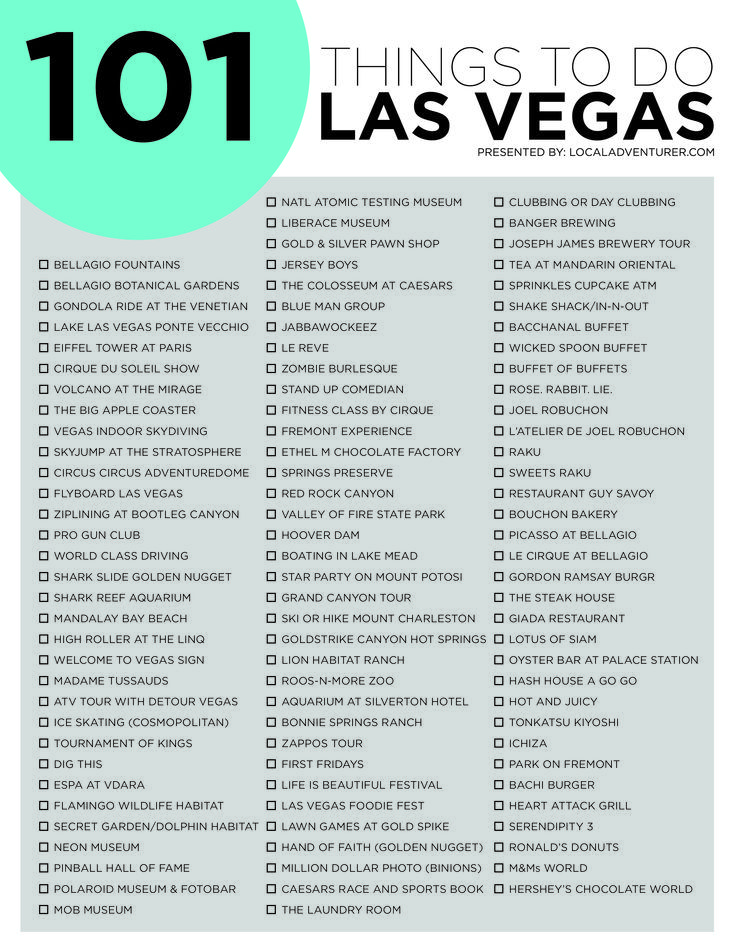 Customers wont mind traveling if it will save them a hundred dollars.
Customers wont mind traveling if it will save them a hundred dollars.
As of now, we are seeing a lot of demand in South Florida, with basically no service providers whatsoever. People are forced to travel to central Florida, and they still have to pay the high prices required by the big ATV rental agencies. If you are in South Florida, or North Florida and feel like opening an ATV Rental business, or offering your ATV’s to rent, your likelihood of success is very high, especially if you are offering very low rates.
Check out this graph showing locations of ATV rental demand in Florida. You can see there is a lot of interest in South Florida, but the opportunity is that there are basically no operators in that area. Even Central Florida has a few providers, but there is so much demand that they can hike up their prices. If you swoop in with your ATV rental business with great prices, serving these underserved communities, it’s sure to take off.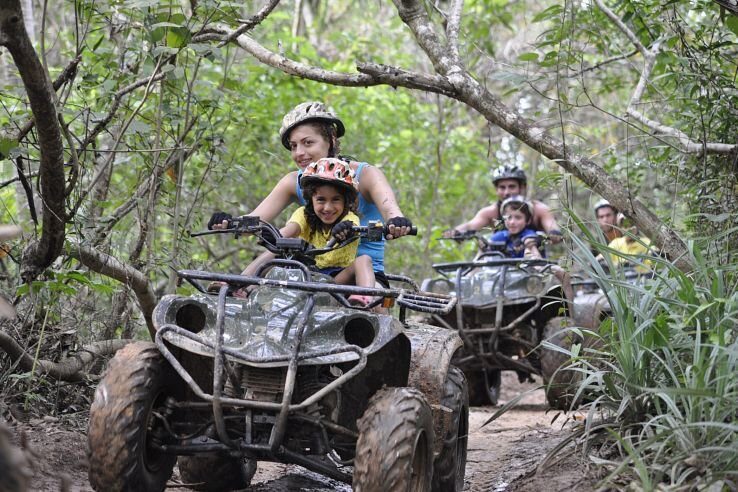
Training your clients before letting them loose is the best way to prevent accidents, damage, and other troubles. You may need equipment to transport your fleet, or a rental service to do it for you. Additionally, leasing hitches and trailers means that you will be required to show clients how to unload the items. Delivering ATVs and Land Rentals into the trail-head demands hiring and monitoring a seasoned motorist.
If you are the only business in the area renting ATVs, you have more flexibility with pricing. However, of course, if you have local competitors, it becomes difficult. Rentals are based on time, type, and add-on equipment. Additionally, a deposit gives you leverage to get your equipment back or pay for damage caused by the client. You can choose to charge by the day, hour, or offer package deals. Should you lease or provide goggles, gloves or helmets, add these prices into their bill as well.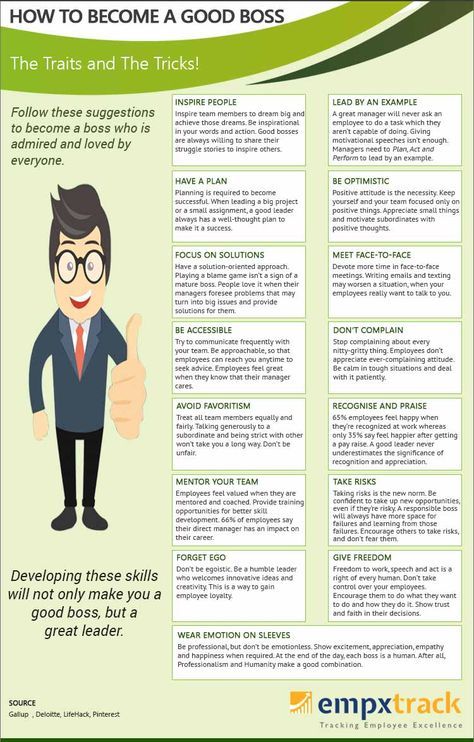
If you choose the route of renting your own ATV’s as a side business, getting the world to learn about your new rentals is always the hardest, and most expensive question. Where do you put your money so that they right people see it at the right time? What mediums should you use? How can you get to market quickly? What’s the short term strategy, and what’s my long term marketing strategy? Should I use tracking software? Booking software? How do I build my website? How do I do digital waivers?
These are all valid questions for newly minted rental business owners, and the good news is; you don’t have to worry about it. Rockon Recreation Rentals has you covered with free tools for you to use using the Activity Booking Software, and Tour Operator Software. Rockon Recreation Rentals was created to help renters like you reach your market quickly and easily by giving rental operators access to the tools, and to the stream of consumers who are searching for things to do.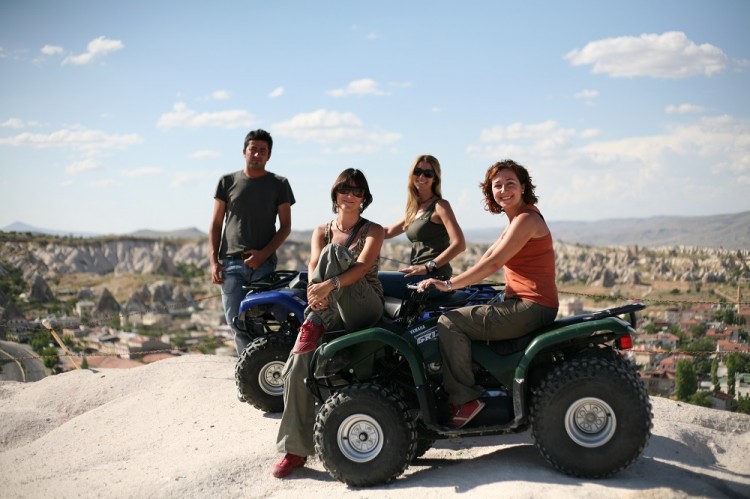
Simply sign up your licensed and insured ATV Rental operation for free, build, monitor, and optimize your listing, and watch your revenue grow on your Rockon Recreation Rentals Dashboard.
Provide amazing service, at a good rate and the wealth will slowly begin pouring in! Are you ready?
Desert Wolf Tours is growing. And, with that growth come periodic job openings. As such, we continually recruit to fill our applicant pool with good candidates. The applicants in the pool are assessed against new openings.
If you are interested in a career with Desert Wolf Tours, please send a cover letter and resume to [email protected]. The subject line of the email should be the position you are interested in. Please have references available.
APPLICATIONS ARE ONLY ACCEPTED VIA EMAIL.
DO NOT CALL INQUIRING ABOUT OPPORTUNITIES! OUR PHONE LINES ARE DEDICATED FOR OUR GUESTS TO CONTACT US TO MAKE RESERVATIONS.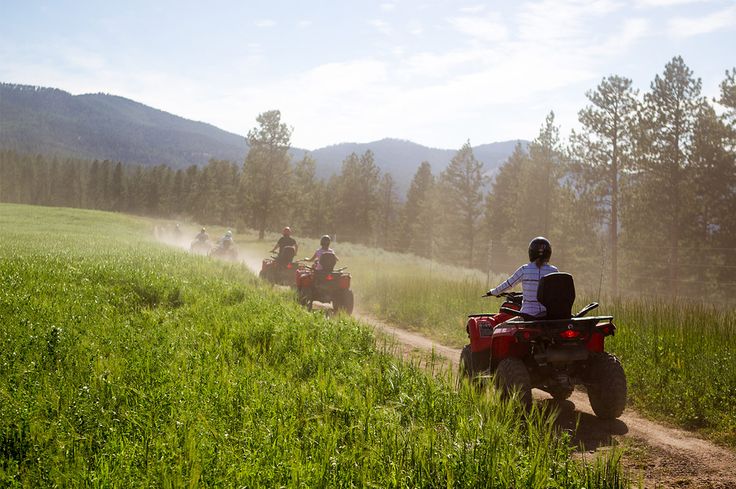 PLEASE DO NOT TIE UP OUR PHONE LINES.
PLEASE DO NOT TIE UP OUR PHONE LINES.
PLEASE NOTE: We do not accept applications from out-of-state applicants. If you are considering relocating to Arizona, please apply when you have done so.
If you do call, you WILL be removed from the application process. Following directions is very integral to your success at Desert Wolf, and every step of the application process is part of your “interview”.
Also, please note that our guiding positions are largely seasonal in income potential. We are our busiest during the winter months (September – May), and a vast majority of your income would be made during that time. While we do have opportunities in the summer for income, understand that hours are long in season, and there is ample time off in the off-season.
Desert Wolf Tours is the #1 Ranked Outdoor Activity company in the Valley and we are looking for a “Jack of all Trades”. This this job description described you, we want to talk to you!
We are a typical hospitality/seasonal tourist business in that our work varies by season. We are looking for a team member that can contribute full-time on a year-round basis. What this means is filling various roles throughout the year, as our workload and needs vary. What is not typical about us is our absolute commitment to delivering CONSISTENT EXCELLENCE for our guests. We offer the BEST adventures and have been ranked #1 every year since 2009. We are in the TripAdvisor Hall of Fame!
We are looking for a team member that can contribute full-time on a year-round basis. What this means is filling various roles throughout the year, as our workload and needs vary. What is not typical about us is our absolute commitment to delivering CONSISTENT EXCELLENCE for our guests. We offer the BEST adventures and have been ranked #1 every year since 2009. We are in the TripAdvisor Hall of Fame!
The ideal person will be an Adventure Guide leading guests out on our top-ranked Half-Day Tomcar ATV Desert Adventure. He/she will also be a Machine Gun instructor (yes, we said machine guns) on our ATV Tour and Machine Gun Adventure where guests get to shoot a variety of machine guns at our desert range. In addition, you’ll be part of our maintenance team helping to maintain our fleet. Our slow period for tours is the summer months, but that is also our busy maintenance months. You may even be asked to work at our horse stable from time to time.
Do you have a passion for the outdoors? Do you enjoy entertaining people? Do you have the unique skills and aptitude to safely handle machine guns? Do you have excellent mechanical aptitude? Can you meticulously follow proven company procedures that lead to consistently excellent adventures and awesome guest experiences? Do you work well with others as part of a #1 team? Do you have a Can Do attitude? Are you a problem solver? Are you coachable? Do you have experience with horses? (This is a plus.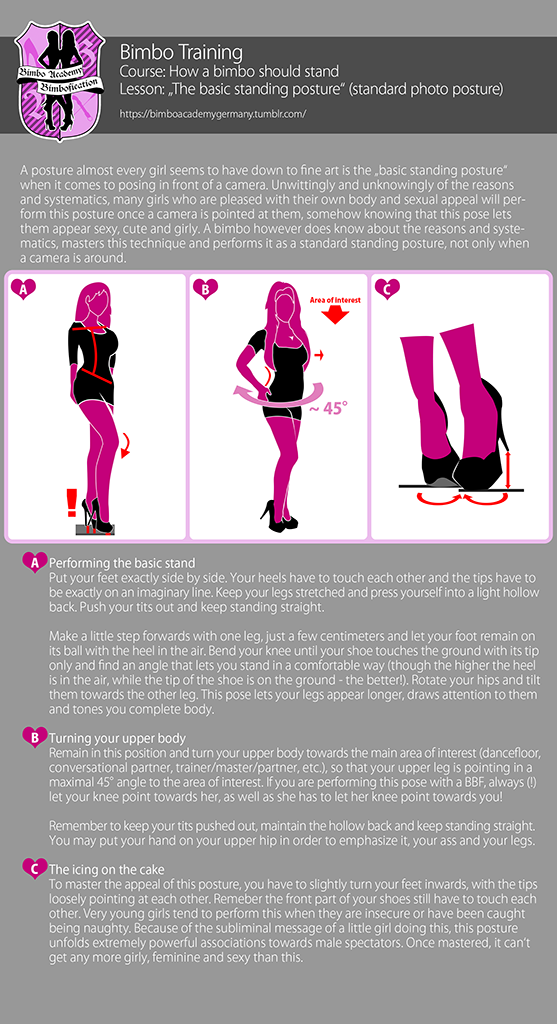 )
)
This job is definitely not for the “typical” person. But, if you are reading this and think, “hey, they are talking to me”, then we want to talk to you!
Desert Wolf Tours is a unique group of 3 companies. We have an off-road tour company. We have a licenses firearms manufacturing company. And, we have a horse stable where our horses are used in our corporate adventure tour marketing (and photo ops). (We don’t do trail rides.)
Salary is commensurate with experience and is a combination of a good hourly wage, monthly performance bonuses and generous tips. The right candidate should expect to earn between $40,000 and $60,000 per year in this full-time position.
This position is based out of our office and maintenance facility in Anthem, AZ.
Requirements:

Do you love off-roading? Do you love working on vehicles? Do you take pride in your work? Do you love solving problems? Join the Wolf Pack as an ATV/UTV Mechanic! The goal? Keep the fleet on the trails! Perform the preventative maintenance, diagnosis and repair, engine work, and service on our fleet of TomCars. If you are looking for a fast paced, rewarding position where your hard work is appreciated, then this is the job for you!
ATV/UTV Mechanics should have:
Requirements:
Quad Tour Safety
It is not allowed to drive an ATV without a protective helmet.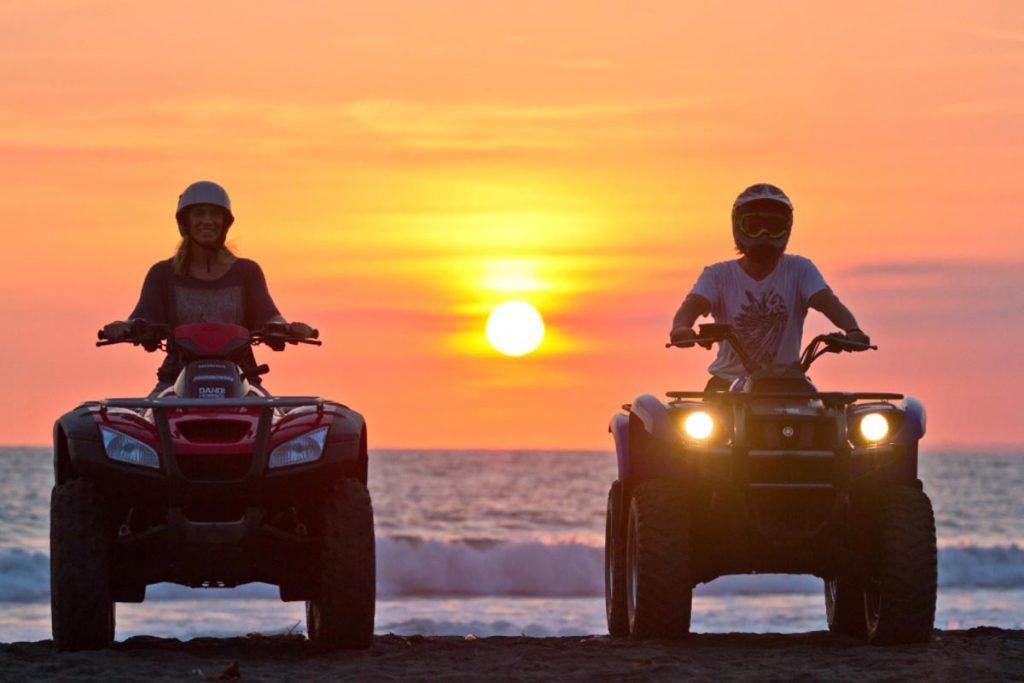 Eye protection (face shield or goggles) must also be worn.
Eye protection (face shield or goggles) must also be worn.
Familiarize yourself with the ATV before driving. Make sure you know the location of the gas, brake, gear lever, and other control-related components.
It is not allowed to drink alcohol before driving the ATV and during stops along the route.
Before each use, make sure the ATV is in good condition and safe to ride. In case of a clear malfunction, contact the instructor guide. Do not start riding a damaged ATV, as this may result in injury to you.
Always be extremely careful and drive at a slow speed when traveling on dangerous sections of the path (steep descent or ascent, scree, river).
Overcoming stone placers, try to deviate back. In this case, you lighten the load on the front wheels, which reduces the risk of equipment damage, the possibility of getting stuck, and helps to avoid other troubles that ATV repairs will entail.
Always keep both hands on the handlebars and both feet on the footrests while riding the ATV.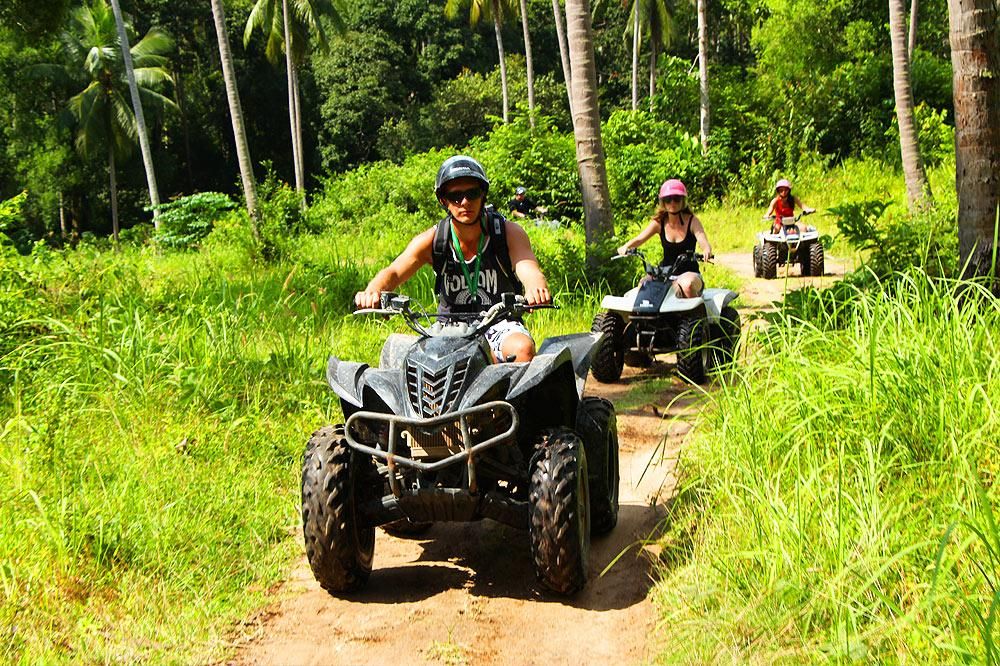
While driving, follow the path laid out by the guide-instructor.
When going uphill, shift your weight forward, never change gears abruptly. Never drive up a hill at high speed.
When going downhill, shift your weight back, never go downhill at high speed. Avoid going downhill at an angle that could cause the ATV to lean to the side. Go straight down if possible.
Be careful when sliding or skidding. On extremely slippery surfaces such as ice, drive slowly and be very careful to reduce the risk of slipping or skidding.
Start braking some time before stopping.
Remember that wet brakes reduce stopping power. Check your brakes after getting out of the water, if necessary, wait a while for the pads to dry out.
Always be sure there are no obstacles or people behind you when you turn.
Never start the engine on a slope as this may cause damage.
If you need to stop (fogged helmet glass, cold hands, etc. ) do not wait for the group to stop. Raise your left hand up (stop signal for ATVs following you) and gently come to a stop.
) do not wait for the group to stop. Raise your left hand up (stop signal for ATVs following you) and gently come to a stop.
Remember basic hand signals:
Left turn: left arm outstretched to the side
Right turn: left arm extended to the sides, bent at the elbow at an angle of 90 degrees
Stop, danger: raised straight left hand up. When you see this signal, be sure to slow down and double your attention.
When driving on a motorway, follow the rules of the road.
When crossing a road, the first thing to do is to stop at the side of the road. The guide-instructor, stopping, evaluates the situation on the road. The group starts moving only after the guide-instructor gives a permission sign.
You need to protect yourself from sun exposure. Remember that in the mountains there is a high level of solar radiation. You can get a burn even on a cloudy day. During the day, avoid looking at snow and other reflective surfaces without sunglasses (which should have a maximum UV filter).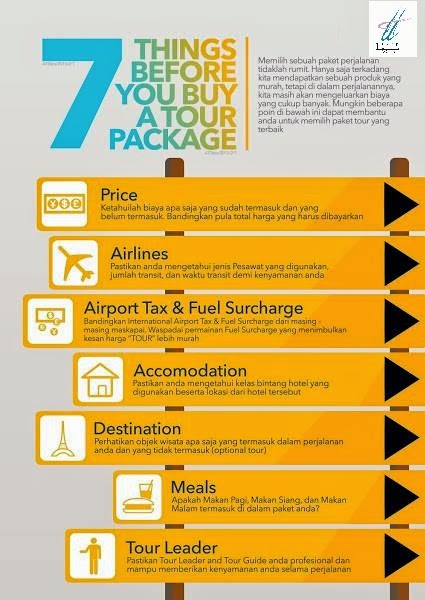 It is mandatory to apply daily sunscreen with a maximum protection factor to all exposed areas of the body (face, ears) before going on the route.
It is mandatory to apply daily sunscreen with a maximum protection factor to all exposed areas of the body (face, ears) before going on the route.
Avoid overheating or hypothermia. You must be dressed appropriately for the current weather and temperature conditions.
Take care of your feet! Take measures in advance against rubbing corns: take only comfortable, well-worn shoes; as a preventive measure, put a patch on all problem areas in advance before going on a route.
Inform the guide-instructor in a timely manner about deviations of your state of health from normal. Carry a personal first aid kit tailored to your individual needs.
Be careful when moving around the camp and its surroundings at night. Orient yourself on the terrain before dark, look around, note possible dangers (steep slopes, cliffs, stones, pits, ice, etc.). Be sure to use a flashlight. Do not go shod somehow, shoes must be laced.
All your things should be placed in the vestibule or inside the tent at night, do not leave them in the open.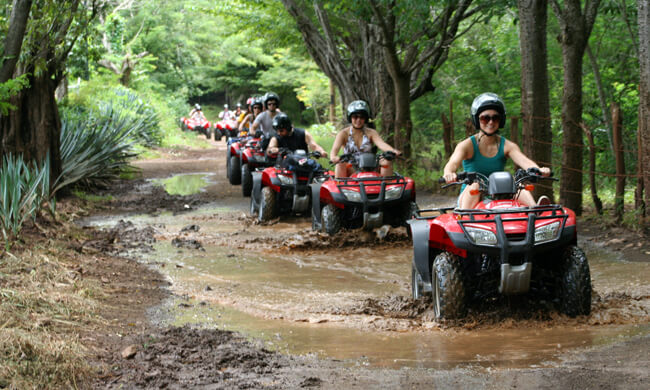 At night, a change in weather, frost is possible.
At night, a change in weather, frost is possible.
Ensuring the safety of personal property and property received for temporary use is the responsibility of tourists. Money, documents (passports, airline tickets, insurance policy, etc.) must be with you at all times, in a waterproof package (bag).
During the trip, the use of alcoholic beverages is not recommended, and the use of narcotic and psychotropic substances is also prohibited. This can lead to a sharp deterioration in your well-being in high altitude conditions, disruption of the acclimatization process and other adverse consequences. In case of violation of this rule, the responsibility for the consequences rests with the tourist.
Throughout the route there is absolute unity of command. Although the guide-instructor takes into account the opinion of each tourist, but the final decision is made solely by the guide-instructor. The guide-instructor may change the program in case of force majeure, as well as in order to save the life and health of the tourist, prevent the tourist from any part of the trip, as well as remove the tourist from the route and take other measures in order to save his life and health.
If the tourist makes any decision and / or performs any actions that contradict the instructions of the guide-instructor, then the tourist assumes all moral, financial and any other responsibility for further events.
The tourist should know that the leader of the trip has the right to stop moving, change the route to a backup option, return to the main and intermediate bases or to the nearest settlements in case of a sharp deterioration in the weather, during natural disasters and under other circumstances that make further movement along the route dangerous.
Four years ago I became a tour guide and went to work in the Indian state of Goa.
Ekaterina Kachalina
tour guide
Author profile
I am a journalist by education and never planned to develop in tourism. In Moscow, I led excursions for foreigners, but it was a part-time job.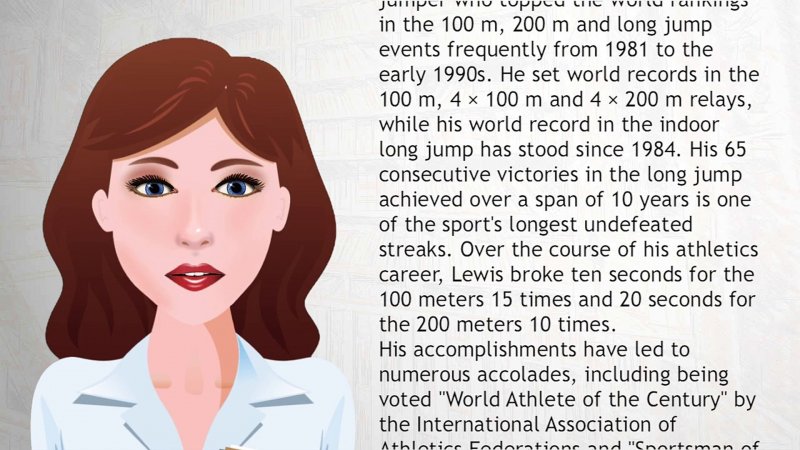 Once a friend told me that she was flying to Goa as a guide, and I realized that I wanted the same. I sent a resume, passed an interview, and then training courses in Moscow. Two months later, I was already leading excursions in India. Before that, I had never been there.
Once a friend told me that she was flying to Goa as a guide, and I realized that I wanted the same. I sent a resume, passed an interview, and then training courses in Moscow. Two months later, I was already leading excursions in India. Before that, I had never been there.
After two seasons in Goa, I worked as a guide in two more companies: in Crete and in the Dominican Republic. Everywhere has its own nuances, but the work and conditions are similar.
My second day in India, 2013The guide conducts excursions for clients of the travel company. His main goal is to make sure that everyone survives and is satisfied.
Depending on the number of people, excursions are divided into group and individual, depending on the route and topic - into historical and entertaining. An ideal guide will cope with any excursion. He will be able to make 60 people laugh on the bus and connect with a family with small children on an individual trip. He knows all the Hindu gods and the chronology of Columbus' travels and will colorfully talk about how a starfish dine.
He knows all the Hindu gods and the chronology of Columbus' travels and will colorfully talk about how a starfish dine.
A guide is a teacher, entertainer, reliable guide and patient mentor. Tourists want the trip to justify the money and time spent. But everyone needs their own: someone wants to have fun, and someone wants to learn the history of the country in detail. A good guide will find a balance and conduct a tour in such a way that everyone in the group will be satisfied.
The starfish crawls up to the mollusk, pushes the shell flaps apart with its legs, sucks firmly, twists the stomach, puts it into the shell and digests the mollusk right in its house. Don't thank! Tourists are interested in different things: some want to walk around the museum longer, others want to shop. Often they get carried away and lose track of time. And when there are several stops on the tour and there is a clear schedule, even a ten-minute delay can disrupt the program.
In Greece, I took excursions from Crete to the romantic island of Santorini. We got there by a catamaran for 1000 seats, which went once a day. There was a program in Santorini, and then free time. Each time I was nervous and prayed that no one would be late and not get lost. Once people were delayed for a long time and the driver had to drive along the serpentine, and the catamaran almost had to jump over the water: the ladder was already being removed.
Such a catamaran delivers 1000 people from Crete to Santorini in 2 hours. Photo by Oleg Elli Sometimes you want to yell at tourists and even punish the whole group for someone's bad behavior, like in a pioneer camp. But if you do this with adults who have paid for the tour, everyone's mood will be spoiled. I used financial arguments: I told tourists in advance how much it would cost them to be late. A ticket for tomorrow's catamaran is 60 €, a night in a normal hotel in Santorini is 100 €, a taxi from the port to a hotel in Crete is another 50 €. Everyone immediately became punctual.
Everyone immediately became punctual.
You have to understand that these are only outwardly adult and conscious people. Inside, they are all children who came to rest.
Tropical countries often go wrong. Cars break down, boats are late, the weather deteriorates, rum runs out. Tourists blame the guide for all troubles: there is no one else. You need to be on the side of people and try to turn the problem into an adventure.
Once our bus was stopped by the police and we stood in the mountains for two hours while they checked our documents. I did not hide from the tourists that all this upset me too, but I explained that we could not influence anything. Funny stories about the country and the mentality of local residents came to the rescue, and I used the situation as a good example. This deflated the situation. In two hours, the guests and I became friends, and they bought other excursions from the company.
Sometimes tourists themselves create difficulties. If a conflict arose within the group, I reminded that we were on vacation in another country and the police were inexorable here. In the event of a fight, they will not figure out who is to blame.
If a conflict arose within the group, I reminded that we were on vacation in another country and the police were inexorable here. In the event of a fight, they will not figure out who is to blame.
If guests complain to the tour guide, the most important thing is to remain calm. You learn this quickly. No matter how strange questions people ask, no matter what they demand, not a single muscle will flinch on the face of a professional guide. Girls like to be asked if they have already married a local. Sometimes I said that yes, we already have five children.
My big imaginary Indian family The guide communicates not only with tourists, but also with contractors - car and boat drivers, cafe employees, event coordinators. He makes sure that everyone completes their tasks and does it on time: he calls the driver in advance to leave the parking lot and meet the group at the square, or rush the waiters at lunch. Contractors do not speak Russian, so English or the local language is indispensable.
Sometimes the group is accompanied by a local guide. This is a cover in case of a meeting with the police. According to the laws of many countries, foreigners are not allowed to work in this position. When meeting with the police, the local guide pretends that this is his group. And the rest of the time he goes about his business.
After each excursion, you need to report on how it went: whether all the guests returned to the hotels, how the contractors worked, whether there were any force majeure events. The report is submitted in paper or electronic form. The work of the guide himself is evaluated by the authorities according to questionnaires filled out by tourists. Usually the guide is rated as excellent, but this is not an indicator. It is embarrassing for tourists to give a low score, because they give the questionnaires to the guide personally.
The real assessment of the work of the guide is in the rest of the questionnaire. Formally, the guide is not responsible for the variety of the menu and the beauty of the sights. But if everything is submitted correctly, tourists will receive more positive emotions and give higher ratings.
But if everything is submitted correctly, tourists will receive more positive emotions and give higher ratings.
For example, my colleague arranged quests for guests in boring ancient ruins: he asked riddles, created antique atmosphere with stories, and even frightened them by portraying a mythical monster. His excursions were the most popular in the company.
Everything worked out on this excursion. This is not always the case90% of excursions start before dawn and end after sunset. The working day of the guide lasts 12-14 hours. From this time, it takes an hour or two to go around all the hotels in the morning and collect guests. Another hour to take everyone back in the evening.
The number of working days depends on how many excursions the tourists have bought. Usually the guide works 5-6 days a week. At the peak of the season, there are 10-15 excursions without days off - until the body and psyche break down. In other months, for example, at the end of December, you sit without work for weeks. It hurts.
It hurts.
12 hours
minimum tour guide working day
Income depends on the company. Some pay a fixed salary and bonuses for each excursion, others only bonuses. My employers paid 400-500 dollars or euros per month and 30-100 dollars from each excursion. It came out $1000-1500 per month.
You can earn a comparable amount on a commission in stores that are official partners of a travel company. They are overpriced, but there is a large selection, and the employees speak Russian. It is impossible not to visit them during the tour, you are fined for this. In order for the guides to have a personal motivation to advertise the store, the owners pay them a percentage of sales or give them gifts - a bottle of good wine, natural shampoo or a cashmere shawl.
There are other bonuses. Often, the company pays for rental housing - a villa or apartment, where 1-2 people live in a room. Sometimes tour guides can eat for free in hotels. Once, I ate all season at one of the best hotels on the island where I lived.
Once, I ate all season at one of the best hotels on the island where I lived.
On excursions, everything that is included for tourists is also included for the guide. Helicopters, yachts, rides on elephants and donkeys, tastings of local sweets, grilled lobsters, massages with aromatic oils, corporate parties in luxury hotels, even bungee flights - an experienced guide cannot be surprised by entertainment. Guides get discounts in shops, club cards are given in restaurants.
There are regulations that the guide must follow: for example, he must wear a uniform and not swim in front of guests. But usually no one follows this. On trips to the islands, most guides calmly sunbathe on sunbeds next to their groups.
But for being late for an excursion, absenteeism or part-time work on the side, they can be fined and even fired.
Sometimes the workplace looks like this. Saona Island, Dominican Republic The easiest way to find a job in tourism is through acquaintances: they will share the mail of the personnel manager in the desired company and say a few words. This does not guarantee success, but significantly increases the chances. You can also ask students of tourism universities, but they themselves are usually offered not the best conditions: one room for four and a total income of $ 300 per month.
This does not guarantee success, but significantly increases the chances. You can also ask students of tourism universities, but they themselves are usually offered not the best conditions: one room for four and a total income of $ 300 per month.
If there are no acquaintances, traditional ways remain. I got my first job as a tour guide by responding to an ad on Headhunter. In order not to miss the vacancies of tour operators on this site, subscribe to the "Jobs Abroad" mailing list.
It is useful to follow the section of vacancies on the websites of the tour operators themselves, for example, Pegasus, Coral Travel, Anex Tour, Tez Tour, Biblio Globus. Many tour operators work with the host: in Russia, the client buys a ticket from one company, and in the country of arrival he is met by employees of another local company. Then you should look for vacancies in the meeting company.
There are closed Facebook groups, such as Repsworld.ru. People with no work experience are not very welcome there, but you still try to apply - suddenly they will approve. Subscribe to the pages of major tour operators: they often post vacancies.
Subscribe to the pages of major tour operators: they often post vacancies.
Recruit employees in advance. Job advertisements for the summer season are published starting from November, for the winter season - from May. A couple of months before the start of the season, by February or August, the recruitment is closed. If you find a vacancy, apply immediately: at the last moment there may be no places left.
Be careful with vacancies in Turkey and Egypt: work in these countries requires especially strong nerves. Tourists overdo it with alcohol, and locals are unfriendly to tourist workers. Guides live in dormitories, it is forbidden to go outside after 23:00. Renting a separate apartment, even at your own expense, is the same. But it is easiest to start a career in tourism from these countries: there are always a lot of tourists there, newcomers are easily accepted. Many return there because it turns out to make decent money.
Interviews are usually conducted via Skype. The employer is interested in whether you worked with people and how you act in unforeseen circumstances, whether you are ready for early rises and an irregular schedule. If your answers suit him, he will tell you what conditions the company offers.
The employer is interested in whether you worked with people and how you act in unforeseen circumstances, whether you are ready for early rises and an irregular schedule. If your answers suit him, he will tell you what conditions the company offers.
After a successful interview, you will be sent an official invitation and a list of documents that you need to collect: visa application form, medical certificate, insurance. Sometimes it takes a couple of weeks, sometimes it takes more than a month - for example, if you need a certificate of good conduct with an apostille to apply for a work visa.
Police clearance certificateThe cost of buying tickets, visas and certificates will be up to 50,000 R. Employers usually return this amount with the first salary. But if you fail to do the job, there will be no compensation.
50,000 R
will have to be spent on tickets, visas and documents to start working as a tour guide. If everything goes well, these expenses will be reimbursed
Tour guides are already being trained on site. Upon arrival, everyone is checked into one hotel and free courses are held. They mainly teach sales and reporting technologies, and the guides look for information about the country on their own.
Upon arrival, everyone is checked into one hotel and free courses are held. They mainly teach sales and reporting technologies, and the guides look for information about the country on their own.
Beginners first go on excursions with experienced guides a couple of times to learn the route and program, and only then they lead them themselves. Between arrival and the start of work, an average of a month or two passes. At first it seems that there is too much material and it is impossible to remember it. But if you make an effort, in a month you can become a specialist in the history, culture and traditions of the country.
A good guide is always learning. He communicates with local residents, reads news and books on the topic, watches films about the country. Tales from life are always more interesting for tourists than mountains of dates and names. If you build a story only on dry academic information, the group will sleep through the entire excursion.
Becoming a tour guide without experience in mass tourism is now more difficult than it was before the crisis. The staff in most companies was reduced, the competition is high. Usually they start from the position of a transferman - an employee who meets tourists from the plane and escorts them to the airport, and also takes them to the store for shopping tours. A transferman's income is capped at a salary of approximately $500. Sometimes there is a commission from the store. It is a hard and monotonous job, an endless groundhog day. But after a successful season, you can switch to excursion or hotel guides.
The staff in most companies was reduced, the competition is high. Usually they start from the position of a transferman - an employee who meets tourists from the plane and escorts them to the airport, and also takes them to the store for shopping tours. A transferman's income is capped at a salary of approximately $500. Sometimes there is a commission from the store. It is a hard and monotonous job, an endless groundhog day. But after a successful season, you can switch to excursion or hotel guides.
500 $
the average monthly salary of a travel agency employee who meets and settles tourists
Hotel guides sell excursions and shopping tours. They earn the most, but they pay for it with the nervous system: their duty is to solve all the problems of the guests. If something breaks in the hotel, tourists call the hotel guide. If guests need laundry at 4 am, they call the hotel guide. If the plane is delayed, they call the hotel guide and yell obscenities at him.